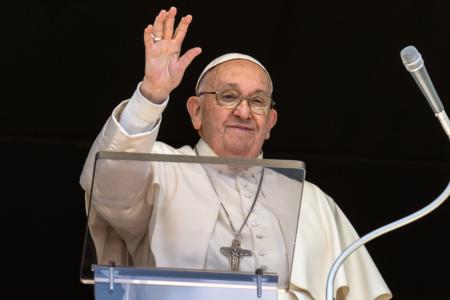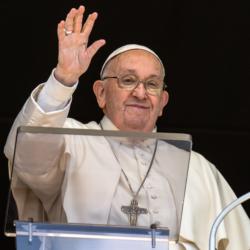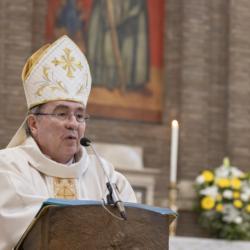Make a statement
Massachusetts has not seen an open Senate seat in more than a generation and Tuesday’s special election to fill the vacancy left after the death of Sen. Edward M. Kennedy is a singularly important time to make the people’s voice heard.
As Catholics, exercising our right to vote is a duty derived from the moral obligation to seek the common good for our society, particularly for those most defenseless and in need. At the same time, we are also obliged to become informed about the broad range of issues at stake and vote with a well formed conscience.
In 2007, the U.S. Conference of Catholic Bishops issued a statement providing guidance for Catholics. We printed a summary of that document prior to the 2008 election. We think it bears repeating at this historic moment.
Those who look for one will undoubtedly find a perfectly valid excuse for why they will be unable to make it to the polls on a chilly Tuesday in January. Yet, with the outcome of every election we are shaping the future of our children and our society.
Don’t make an excuse; make a statement. Exercise your right to shape the future of Massachusetts and the nation.
Citizenship and the Well-Informed Conscience
How is a Catholic to fulfill his or her role as a citizen? The Roman Catholic Bishops in the United States addressed this important question in their 2007 statement entitled “Forming Consciences for Faithful Citizenship.” All Catholics are urged to read and reflect on this document, which is summarized here. References to the full statement include the title’s initials, “FCFC,” and the relevant paragraph numbers.
1.) Why does the Catholic Church speak out on the moral aspects of political life?
The teaching role of the Catholic Church is rooted in the reality that every person has a conscience, and assumes that citizens want to act conscientiously, especially when justice and human rights are at stake (FCFC 17). Forming one’s conscience “begins with a willingness and openness to seek the truth and what is right” (FCFC 18). Catholic social teaching is based on “fundamental ethical principles that are common to all people” (FCFC 55). Thus, by proposing answers touching on the moral dimensions of citizenship that appeal to human reason, the Church is not imposing its religion but instead is responding to every person’s innate desire to uphold the good, including in the public arena. A moral concern for the inviolable dignity of every human being is at the core of the Church’s social teaching (FCFC 10).
2.) But shouldn’t morality be separated from law and public policy?
Law and public policy involve questions of social justice. Justice is concerned about what is right and good, and thus has an objective moral dimension that the Catholic Church is equipped to address (FCFC 9-10). The Church sees its function not as a power broker that replaces the state, but as a source of wisdom providing “greater insight into the authentic requirements of justice” (FCFC 14, quoting Pope Benedict XVI). Besides, “our nation’s tradition of pluralism is enhanced, not threatened, when religious groups and people of faith bring their convictions and concerns into public life” (FCFC 11). The different functions of church and state do not dictate a divorce between law and morality or the exclusion of moral persuasion from the public arena, especially when the dignity of the human person is at stake. The Church is not demanding that government adopt Catholic teachings, but it is insisting that society must defend human rights.
3.) Is the Church telling me whom to vote for in the next election?
No, because that question involves all kinds of personal considerations that “take into account a candidate’s commitments, character, integrity, and ability to influence a given issue” that are best left to the individual voter (FCFC 37). Besides, citizenship covers more than just voting. It includes campaigning for candidates for elective office as well as getting involved in ballot questions, entering government service itself, and otherwise working at the grassroots, regional, and national levels to influence public policy. Being an active citizen, engaged in the political life of one’s own town, state, and country, fulfills the moral duty to promote the common good (FCFC 2). Rather than telling Catholics which candidates to support or oppose, the Church offers basic guidelines for making civic choices in and outside the voting booth consistent with moral principles.
4.) What are the key moral principles of concern to the Church?
There are certain “universal moral truths” about the human person that citizens should always seek to uphold in their civic actions (FCFC 33). Politics must always abide by “fundamental values, such as respect for human life, its defense from conception to natural death, the family built upon marriage between a man and a woman, the freedom to educate one’s children, and the promotion of the common good in all its forms” (FCFC 14, quoting Pope Benedict XVI). Though politics may involve the art of compromise, these goods are non-negotiable. To interfere with them is always and everywhere wrong. “There are some things we must never do, as individuals or as a society because they are always incompatible with love of God and neighbor” (FCFC 22). While not every moral principle can be enshrined in law, “it is important to recognize that not all possible courses of action are morally acceptable” (FCFC 20).
5.) Are there some wrongs that are more serious than others?
Yes. It is wrong always and everywhere, for example, to intentionally destroy innocent human life, promote racism, recognize same-sex marriage, or abandon the poor and the vulnerable by preferring the rich and the powerful (FCFC 22, 29, 46, 50-51, 86). Such actions are “always opposed to the authentic good of persons” and are therefore called “intrinsically evil” (FCFC 22). Additionally, there is a “moral imperative to respond to the needs of our neighbors--basic needs such as food, shelter, health care, education, and meaningful work--[that is] universally binding on our consciences” (FCFC 25). Moreover, the Church’s consistent ethic of life “neither treats all issues as morally equivalent nor reduces Catholic teaching to one or two issues” (FCFC 40).
6.) But aren’t there legitimate differences of opinion for Catholics on issues of public policy?
The Church insists that “those who knowingly, willingly, and directly support public policies or legislation that undermine fundamental moral principles cooperate with evil” (FCFC 31). A well-informed conscience will never support intrinsically evil actions (FCFC 18). But “the judgments and recommendations” issued by Church leaders in other areas such as “the war in Iraq, housing, health care, and immigration ... do not carry the same moral authority as statements of universal moral teachings” (FCFC 33). Thus, for example, while a “well formed conscience aided by prudence ... begins with outright opposition to laws and other policies that violate human life or weaken its protection” (FCFC 31), the affirmative duty to respond to the needs of others “may be legitimately fulfilled by a variety of means” (FCFC 25). In determining how these affirmative obligations should be met, prudential judgments may legitimately differ and there is greater freedom in the exercise of one’s conscience. But even for these issues, not all choices may be equally valid, and the guidance of the Bishops should be carefully considered (FCFC 33).
7.) What does Church teaching say about voting, especially when there is no perfect candidate?
Voting in good conscience depends on the ability to “perceive the proper relationship among moral goods” (FCFC 34). Not all the reasons that a particular candidate may offer for his or her election will “carry the same moral weight” (FCFC 37). If one’s vote is based on an endorsement of a candidate’s position favoring abortion rights or racism, for example, then no matter how good the candidate may be on other issues, the “voter will be guilty of formal cooperation in a grave moral evil” (FCFC 34). In addition, a voter legitimately may vote against an otherwise suitable candidate based on “a single issue that involves an intrinsic evil” (FCFC 42). This is because “the moral obligation to oppose intrinsically evil acts has a special claim on our consciences and our actions” (FCFC 37). The Church cautions such voters however not to be indifferent or inattentive to other important moral issues (FCFC 34).
8.) May a Catholic ever vote for a candidate who favors abortion access or other intrinsic evils?
Yes, a voter “who rejects a candidate’s unacceptable position” favoring an intrinsic evil nonetheless may vote in good conscience for that candidate despite his or her wrong position, but only if there is no better alternative on the ballot and one’s vote is based on “truly grave moral reasons” (FCFC 35). The U.S. Bishops’ 2007 statement does not describe what sort of serious reasons may justify voting for a candidate that, for example, backs abortion access, but it does reject a voter’s desire to “advance narrow interests,” further “partisan preferences,” or otherwise “ignore a fundamental moral evil” as insufficiently grave (FCFC 35). One’s political engagement should be “focused on the dignity of every human being, the pursuit of the common good, and the protection of the weak and the vulnerable” and thus “as Catholics, we should be guided more by our moral convictions than by our attachment to a political party or interest group” (FCFC 14).
9.) Where can I obtain the U.S. Bishops’ 2007 statement?
The full text of “Forming Consciences for Faithful Citizenship” can be found on the website for the United States Conference of Catholic Bishops at http://www.usccb.org/faithfulcitizenship/FCStatement.pdf. Booklet copies can be ordered online at http://www.usccbpublishing.org or by calling 1-800-235-8722.
“Citizenship and the Well-Informed Conscience: 2008” is produced by the Massachusetts Catholic Conference.



















